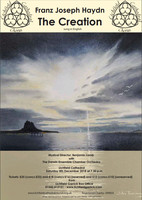The Creation ()
Perhaps the defining composition of a fine musical career, Joseph Haydn’s The Creation is packed full of musical colour, adventurous harmonies, rhythmic inventiveness and great tunes and tells its story with exceptional power and almost operatic vividness. Can there be a better, happier or more life-affirming way to prepare for the Christmas season?
In this performance of this much-loved and hugely optimistic work Lichfield Cathedral Chorus, under the baton of its Musical Director, Ben Lamb, will be joined by the Darwin Ensemble Chamber Orchestra (leader Alex Laing) and soloists.
Pieces
- The Creation (1798) — Haydn
Venue
Lichfield Cathedral, The Close, Lichfield, WS13 7LD [map]
« Parry Choral Works (Jun 2018) ‖ Carol Concert (Dec 2018) »
Reviews
Review of The Creation
It must have been a shock for the 1798 audience at the first performance of old Papa Haydn’s great new and long-awaited work, The Creation, to hear the chaotic opening orchestral bars, apparently abandoning all current conventional structure and harmony, and truly representing Chaos. The Darwin Ensemble rose to the occasion at the opening of Lichfield Cathedral Chorus’s confident performance in the Cathedral of this much-loved work, and the evening continued to unfold with ever-increasing confidence from both choir and orchestra alike under the baton of Ben Lamb.
This is Haydn at his best; being renowned as the “father of the string quartet”, his innovations within such classical structures are sometimes overlooked, and his experimentations particularly using relatively new instruments are much in evidence here, both in the scrunchy opening harmonies and in the glorious word-painting throughout… we all enjoyed the contrabassoon depicting the heavy beasts treading the ground! Indeed, Haydn’s use of his forces, whilst superficially following the traditional oratorio pattern of soloist recitative, arias and choruses, is perfectly blended here into an unfolding of the Creation story, blossoming from that opening chaos to resounding joy in the final chorus of praise, a powerful fugue.
The soloists form the core, telling the story vibrantly and helping us reflect on the variety of God’s creation. The light tenor William Edwards fitted the bill perfectly, with his clear diction and unforced tone, whilst soprano Joelene Griffith was a delight not only to hear but also to watch, with her lovely smile warming the audience’s heart, though some swallowing of consonants led to diction problems in places. Baritone Samuel Queen had a varied part as both Raphael and later Adam, which he managed well, blending with his Eve delightfully, but there was a certain lack of gravitas in some of the more meaty parts of the role. The three of them, however, formed a beautifully-balanced trio, ably supported by some crystal-clear continuo playing by Alexander Woodrow and by Cathy Lamb in her cameo role in the final movement.
Throughout the evening the choir sang with great energy and conviction, but in the chorus Achieved is the glorious work, (achieved being so much better a word than the completed which we had in the programme’s translation) they really came to life, with a bright and well-balanced sound, truly communicating the glories of God’s creation. Some leads in other choruses were a little sluggish…those off-beat entries which Haydn uses so often do need early breathing and preparation. It is good, though, to see and hear an increasingly well-balanced choir, with plenty of tenors and ever more confident singing, particularly amongst the men.
Strangely, the stars of this particular show may well have been the wonderful array of paper doves hanging over the nave as part of the Christmas “Imagine Peace” display. The difference in sound quality was palpable, giving an intimacy and a much more immediate sound and clarity for all performers…a fortuitous circumstance on this occasion. But such subtleties shouldn’t be necessary for the Chorus’s next performance, the Verdi Requiem in April!
Megan Barr, December 2018
